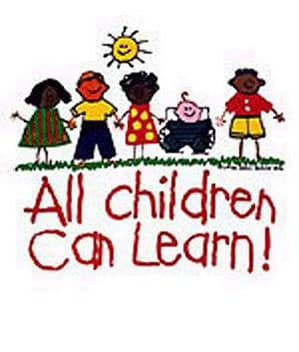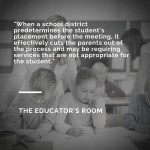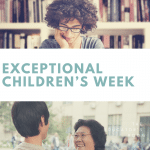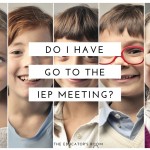All students, whether in elementary or high school, should have a discussion with their parents or guardians about what they want to do after completing high school. Students with disabilities are no different. Except their discussion is required by The Individuals with Disabilities Education Act (“IDEA”) and mandates the inclusion of special education teachers, general education teachers, and other agency officials responsible for providing post-secondary services to these students.
The discussion that special needs students have about their future is embodied in their transition plan, which is a part of their Individualized Education Program (“IEP”). The transition plan is a very important component of the student’s IEP because it requires the student to set post-secondary goals and take affirmative steps in high school to achieve those goals.
IDEA requires “transition services” for special needs students. Transition services are a synchronized set of activities that:
(1) Are designed to be a results-oriented process that focuses on the movement from high school to post-high school activities;
(2) Are based upon the needs of the individual student, taking into account the student’s interests, preferences, and current performance levels; and
(3) Includes instruction, community experiences, adult living objectives, and, when appropriate, functional vocational evaluation.
A transition plan must be included in every IEP once the student reaches the age of 16. When preparing for the meeting to discuss the transition plan, several individuals must be invited to attend.
(1) The student. The student must be invited to attend the IEP meeting. After all, the discussion will concern what the student’s plans are after completion of high school. The best way to determine those plans will be to have the student there personally, instead of having a parent or teacher speak about what they believe the student wants. During the IEP meeting, the student should discuss his or her goals, interests, and preferences for life after high school.
(2) The parent. The parent must also be invited to attend the IEP meeting in order to help develop the transition plan. The invitation may also include whether other agencies will be invited as well. This will provide the parents with enough notice to think about what services they believe will be appropriate for their child.
(3) The agency(ies). Any agencies that will be responsible for providing and/or paying for transition services are invited to participate in developing the transition plan. This requirement reinforces the spirit of IDEA to provide for the long-term development of children with disabilities.
Failing to include a transition plan in the student’s IEP after the student’s 16th birthday is a violation of IDEA. But, that does not mean that the IEP team should neglect the importance of developing a transition plan that is measurable and will meet the student’s needs. Having a transition plan that is not results-oriented and does not take into account the student’s current performance level is also a violation of IDEA.
In Klein Independent School District v. Hovem (S.D. Tex., 2010), a federal district court ruled that a school district violated the IDEA by not developing an individualized transition plan. The student in Klein received special education services due to a learning disability. In his transition plan, one of the goals was for him to pass all of his classes each year with 70% mastery. Although he passed all of his classes, he failed the state’s assessment in the area of English/Language Arts three times, where passage was a requirement for graduation. The parents eventually withdrew him from public school and enrolled him in a private institution that focused on highly intelligent students with language learning disabilities. The student, who had reached the age of majority, and his parents brought suit against the school district, alleging that the district failed to provide a Free Appropriate Public Education (“FAPE”).
The district court agreed with the student and parents’ argument. The court reasoned that although the IEP included a transition plan, the plan was too general to assist the student in post-secondary life. It should have been more personalized in light of the fact that the student failed the state’s English/Language Arts assessment. Because the transition plan was merely a restatement of prior years’ goals, the district violated the IDEA.
When developing the transition plan for special needs students, their strengths, weaknesses, goals, and current performance levels must be considered. The entire purpose behind the transition plan is to set forth a roadmap of success for the student. This can only be done if reasonable, measurable goals are written with the input of the student, parents/guardians, special education and general education teachers, and the providers of agency services.
What questions do you ask students when developing their transition plans?





